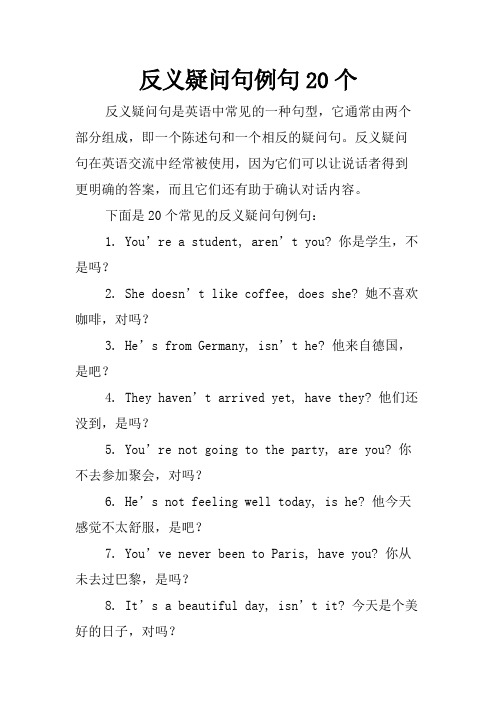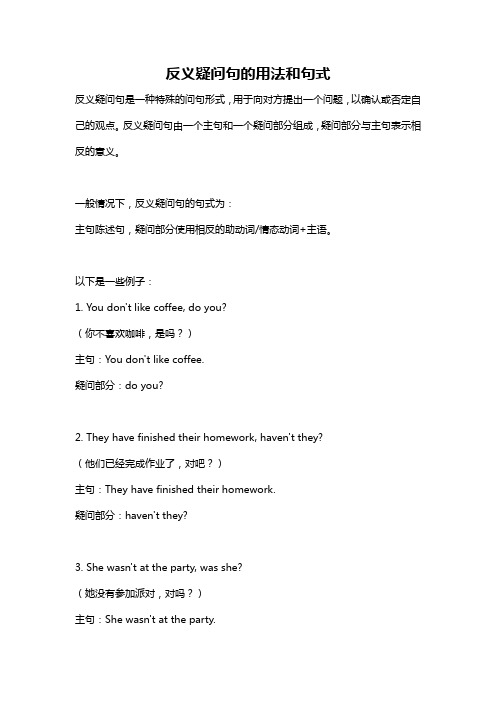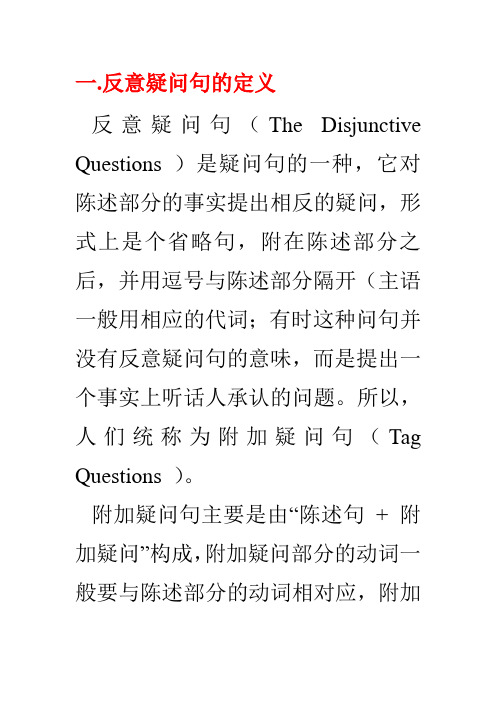反义疑问句
反义疑问句 英语

反义疑问句英语【30条】反义疑问句(tag question)通常由一个陈述句和一个由助动词、主语和否定词构成的短语组成,用于征求听者的同意或确认。
反义疑问句的形式根据陈述句的情态动词、时态和语态的不同而有所变化。
下面是一些例子:1.You can come with me, can't you?(你和我一起去,可以吧?)2.She's not coming, is she?(她不来了,对吧?)3.He hasn't finished yet, has he?(他还没完成,对吗?)4.They were at the party, weren't they?(他们去了派对,是吧?)5.You wouldn't mind helping, would you?(你不介意帮忙,是吗?)6.It's too hot to go out, isn't it?(出去太热了,不是吗?)7.He's a good singer, isn't he?(他唱得很好,对吧?)8.They don't like spicy food, do they?(他们不喜欢辣的食物,对吗?)9.She must be tired, isn't she?(她肯定累了,是吗?)10.You won't forget, will you?(你不会忘,对吧?)11.You don't like ice cream, do you?12.She hasn't finished the project yet, has she?13.He won't be joining us for dinner, will he?14.They don't live in the city, do they?15.You didn't forget to bring your passport, did you?16.He can swim, can't he?17.She isn't coming to the party, is she?18.They haven't seen the movie, have they?19.You won't be late for the meeting, will you?20.He didn't eat all the cake, did he?21.She doesn't speak Spanish, does she?22.They haven't traveled to Europe, have they?23.You haven't finished your homework, have you?24.He won't forget to bring the book, will he?25.She doesn't like coffee, does she?26.They haven't finished their work, have they?27.You won't be leaving early, will you?28.He didn't lose the game, did he?29.She won't be staying for the weekend, will she?30.They don't prefer tea over coffee, do they?。
反义疑问句

陈述部分的主语是指示代词this或that时,反 意疑问句的主语用it,当陈述部分的主语是 指示代词these或those时,其反意疑问句 的主语用they。例如: This is a plane, isn't it? 这是一架飞机,是吗? These are grapes,aren't they? 这些是葡萄, 是吗?
19. 陈述部分是有and, or, for, but 等引起的 并列结构时,疑问部分与邻近分句保持一 致。 We must study hard, or we shall fail, shan’t we?
20. 陈述部分用neither…nor, not only…but also,等连接主语时,疑问部分用复数代词。 Neither you nor I can do it, can we? Not only she but also I passed the exam, didn’t we?
10.当陈述部分所含的否定词是通过加前缀或 后缀构成的,其后的反意疑问句依然用否 定结构。例如: It is unfair, isn't it? 这不公平,是吧?
11.含有否定含义的词在陈述部分作动词的宾 语时,其反意疑问句用肯定结构,也可以 用否定结构。例如:You got nothing from him, did you? 你从他那儿什么也没得到, 是吗?
21.陈述部分的主语是each of...结构时,附 加疑问句在强调整体时用they,当作个别 时用he。
22. 陈述部分有would rather +v.,疑问部分 多用 wouldn't +主语。 He would rather read it ten times than recite it, wouldn't he?
反义疑问句例句20个

反义疑问句例句20个反义疑问句是英语中常见的一种句型,它通常由两个部分组成,即一个陈述句和一个相反的疑问句。
反义疑问句在英语交流中经常被使用,因为它们可以让说话者得到更明确的答案,而且它们还有助于确认对话内容。
下面是20个常见的反义疑问句例句:1. You’re a student, aren’t you? 你是学生,不是吗?2. She doesn’t like coffee, does she? 她不喜欢咖啡,对吗?3. He’s from Germany, isn’t he? 他来自德国,是吧?4. They haven’t arrived yet, have they? 他们还没到,是吗?5. You’re not going to the party, are you? 你不去参加聚会,对吗?6. He’s not feeling well today, is he? 他今天感觉不太舒服,是吧?7. You’ve never been to Paris, have you? 你从未去过巴黎,是吗?8. It’s a beautiful day, isn’t it? 今天是个美好的日子,对吗?9. He can’t swim, can he? 他不会游泳,对吗?10. She doesn’t like pizza, does she? 她不喜欢披萨,对吗?11. You’re not afraid of heights, are you? 你不怕高,对吗?12. They won’t be able to attend the meeting, will they? 他们不能参加会议,对吗?13. They’re leaving tomorrow, aren’t they? 他们明天要走了,对吗?14. He’s never been skiing, has he? 他从未滑过雪,对吗?15. She’s not going to the concert, is she? 她不去音乐会,对吗?16. You’re not worried about the exam, are you? 你不担心考试吧,对吗?17. He didn’t eat breakfast this morning, did he? 他今天早上没吃早餐,对吗?18. They’r e not going to the beach, are they? 他们不去海边,对吗?19. You’ve already seen the movie, haven’t you? 你已经看过这部电影了,对吗?20. He’s not coming to the party, is he? 他不来参加聚会,对吗?在使用反义疑问句时,需要注意的是,它们并不总是表示对话者的不确定或疑虑。
反义疑问句

conversation n.交谈;谈话hold/have a conversation with 和……谈话Children quickly get bored by adult conversation.aloud adv.大声的;出生地aloud是相对于默读而言,声音不一定很大。
常与read,say等动词连用。
loudly表示有目的的提高音量以便让人听见。
常指声音高且喧闹、不悦耳等patient adj.有耐心的n.病人be patient with/to 对……有耐心be patient of sth忍耐某事Are you patient enough to teach me how to send email?discover v.发现;发觉dis(否定前缀)+cover(覆盖)发现We discover this beach while we were sailing around the island.secret n.秘密;秘诀adj.秘密的;保密的通常用作单数名词,其前加定冠词the。
keep a secret 保密the secret to ……的秘诀in secret 秘密地,暗地里let out a secret泄露机密tell sb a secret 告诉某人一个秘密Your secret is safe with me.look up(再词典、参考书中或通过电脑)查阅;抬头看We I called him,he looked up from his paper he was writing.I look up the word in several dictionaries.repeat v.重复;重做repeat本身已包含“重、又、再”的含义,故不可与“again”连用。
Please repeat what I’ve just told you.increase v.增加;增长increase by 增加了increase to 增加到Try to increase thenumber of your words.they’ve increased the price by 50﹪.speed n.速度at the speed of 以……的速度with all speed 以全速Extreme care is always needed when flying at high speed.born v.出生adj.天生的be born with 天生具有be born in 出生于Her borther was born with blind.connect v.(使)连接;与……有联系connect with 把……和……连接起来connect to 把……连接到……Connect the speakers to the CD players.knowledge n.知识;学问knowledge是不可数名词,但有时可加不定冠词,意为“对……有某种程度的了解”;knowledge 不能做learn的宾语,只能说get some knowledge。
反义疑问句的用法和句式

反义疑问句的用法和句式
反义疑问句是一种特殊的问句形式,用于向对方提出一个问题,以确认或否定自己的观点。
反义疑问句由一个主句和一个疑问部分组成,疑问部分与主句表示相反的意义。
一般情况下,反义疑问句的句式为:
主句陈述句,疑问部分使用相反的助动词/情态动词+主语。
以下是一些例子:
1. You don't like coffee, do you?
(你不喜欢咖啡,是吗?)
主句:You don't like coffee.
疑问部分:do you?
2. They have finished their homework, haven't they?
(他们已经完成作业了,对吧?)
主句:They have finished their homework.
疑问部分:haven't they?
3. She wasn't at the party, was she?
(她没有参加派对,对吗?)
主句:She wasn't at the party.
疑问部分:was she?
4. He can't swim, can he?
(他不会游泳,对吗?)
主句:He can't swim.
疑问部分:can he?
需要注意的是,在反义疑问句中,疑问部分的助动词/情态动词与主句的时态和人称保持一致,并使用正式陈述的词序(即将助动词/情态动词置于主语之前)。
同时,反义疑问句通常用于口语交流中,以期望得到对方的确认或否定。
反意疑问句

一.反意疑问句的定义反意疑问句(The Disjunctive Questions )是疑问句的一种,它对陈述部分的事实提出相反的疑问,形式上是个省略句,附在陈述部分之后,并用逗号与陈述部分隔开(主语一般用相应的代词;有时这种问句并没有反意疑问句的意味,而是提出一个事实上听话人承认的问题。
所以,人们统称为附加疑问句(Tag Questions )。
附加疑问句主要是由“陈述句+ 附加疑问”构成,附加疑问部分的动词一般要与陈述部分的动词相对应,附加疑问部分的主语要与陈述部分的主语相对应,如果陈述部分的主语是名词词组,则附加疑问部分用相应的代词表示。
二.附加疑问句的类型附加疑问句的类型为:陈述句+ 反意附加疑问。
该类型又可以分为以下两种情况阐述:①当陈述句为肯定式时,附加疑问句用否定形式,即肯定的陈述句+否定的附加疑问句。
例句:It's very hot today, isn't it ? Yes, it is . 今天天气很热,是不是?是的,很热。
That clock is slow ,isn't it? Yes, it is. 这钟是缓慢的,不是吗?是的,它是。
You want to get your TV set back , don't you ? Yes , I do.你想您的电视机回来,不是吗?是的,我是这样想的。
②当陈述句用否定式时,附加疑问句用肯定形式,即否定的陈述句+肯定的附加疑问句。
例句:It isn't very hot today, is it ? 今天不是很热,是吗?That clock isn't slow ,is it ? 这钟不是缓慢的,是吗?注意这一类型的附加疑问句的回答,不管问题的提法如何,若事实是肯定的,就要用yes,事实是否定的,就要用no,这与汉语不一样,应特别注意。
例句:She isn't a teacher , is she? 她不是教师,是吗?Yes , she is. 不,她是。
反义疑问句知识点

反义疑问句反义疑问句:在陈述句后附加一个简短的疑问句,可以表示疑问,也可以表示说话者的某种倾向,强调或反问。
反义疑问句通常由两个词组成:第一个词是be、情态动词、助动词;若为否定,not用简略形式。
第二个词是人称代词主格(与陈述句主语相同)。
例:……,can't we? 和……,can we?⑴一般情况下:前面陈述句是肯定句,后面反义疑问句部分用否定;即“前肯定后否定,前否定后肯定”。
⑵当陈述句部分有表示否定或部分否定意义的词如little,barely,hardly,rarely,scarcely,seldom,few,no,never,nothing,not等词时,反意疑问句部分要用肯定形式。
You can hardly blame Tom for leaving early, can you?你不能责怪汤姆提前离开,是吗?当陈述句部分中表示否定意义的词为含有im-,in-,dis-,un-等否定前缀或-less等否定后缀的词时,应把陈述句部分视为肯定句,反意疑问句部分要用否定形式。
(有否定意义,但不能算否定词)Tom dislikes the book,doesn't he? 汤姆不喜欢这本书,是吗?⑶陈述句主语不同情况①当陈述句部分的主语是everyone,someone,anyone,no one,everybody,somebody,anybody,nobody等表示人的不定代词时,反意疑问句部分的主语通常用he,但口语多用they;Nobody wants to go here,does he/do they?没有人想去那里,是不是?②当陈述句部分的主语是anything,everything,nothing,something 等表示物的不定代词时,反意疑问句部分的主语常用it.Everying seems all right now,doesn't it?似乎一切顺利,是不是?②当陈述句部分的主语是I 时,反意疑问句部分的主语常用aren't I.若表示征询对方意见时,疑问句部分用do you.I am healthy,aren't I?我很健康,对吗?I don't like this film,do you?我不喜欢这部电影,你呢?④当陈述句部分的主语是不定式(短语)或动名词(短语)时,反意疑问句部分的主语常用it.Learning English well takes a long time,doesn't it?学好英语需要好长时间,是不是?②当陈述部分的主语是指示代词this /that或these /those时,疑问句中的主语分别用it或theyThis is important, isn't it? 此事很重要,是不是?②如果陈述部分是以代词one作主语疑问句的主语,在正式场合用one 非正式场合用you在美国英语中非正式场合下,还可以用heOne cannot be too careful, can one /can you? 越仔细越好,对不对?②陈述部分有neither…nor 或both …and连接两个主语时,疑问句部分的主语常用复数形式。
反意疑问句

20) 当 have 为实意动词时要分两种情况: (1)若表示“所有”,反意疑问句可以用have,也可以 用do: eg: He has a lot of friends here, hasn’t / doesn’t he? 但是若陈述部分用的是have的否定式,反意疑问句用 have 还是用do,取决于陈述部分的动词形式: eg: He hasn’t any money, has he? He doesn’t have any money, does he? (2) 若表示“吃”、“玩”等其它意思,反意疑问句要 用助动词do: eg: He has supper at 5, doesn’t he? eg: He had a good time at the party, didn’t he?
4) 含有ought to 的反意疑问句,陈述部分是肯定的,疑问部 分用shouldn't / oughtn't +主语。 eg: He ought to know what to do, oughtn't he? / shouldn't he? 5) 陈述部分的谓语是used to 时,疑问部分用didn't +主语或 usedn't +主语。 eg: He used to take pictures there, didn't he? / usedn't he? 6) 陈述部分有would rather +v.,疑问部分多用 wouldn't +主 语。 eg: He would rather read it ten times than recite it, wouldn't he?
- 1、下载文档前请自行甄别文档内容的完整性,平台不提供额外的编辑、内容补充、找答案等附加服务。
- 2、"仅部分预览"的文档,不可在线预览部分如存在完整性等问题,可反馈申请退款(可完整预览的文档不适用该条件!)。
- 3、如文档侵犯您的权益,请联系客服反馈,我们会尽快为您处理(人工客服工作时间:9:00-18:30)。
反义疑问句
注意宾语从句的反意疑问句的对应规则:
一、若反意疑问句的陈述部分为I (we)think(believe,suppose,consider)+that
从句时,问句部分的助动词和主语与that从句内的动词和主语保持一致。
eg.1.I think that he has done his best, hasn't he?
2.We think that English is very useful, isn't it?
二、若反意疑问句的陈述部分为I (we)don't
think(believe,suppose,consider)+that从句时,从句为否定意义,问句部分的助动词和主语仍与that从句保持一致,用肯定形式。
eg.1.I don't think that you can do it, can you?
2.We don't believe that the news is true, is it?
三、反意疑问句的陈述部分为非第一人称主语+think (believe,suppose,consider)+that
从句时,问句部分的助动词和主语与陈述部分的助动词和主语保持一致。
eg.1.They all think that English is very useful, don't they?
2.He didn't think that the news is true, did he?
回答者:窒息的月亮 - 魔法师四级 3-31 22:16
We think that we will win the game,won't we?
.陈述部分为宾语从句时
⑴ A 主句主语为第一人称时,并且谓语动词是believe 、think 、suppose 、imagine
、expect等——附加疑问部分的主语和谓语与从句保持一致(此时,还要注意否定转移)
B 主句主语为第一人称时,并且谓语动词是除了believe 、think 、suppose 、imagine
、expect等以外的词,附加疑问部分的主语和谓语与主句保持一致
⑵ 主句主语是其他人称时——附加疑问部分的主语和谓语与主句保持一致
①I suppose father is sleeping ,isn’t he ?
②I don’t think you are right ,are you ?
③We told him we would go there next week ,didn't we ?
④He said that he would come back next Monday ,didn’t he ?
⑤They don’t think that she will win ,do they ?。
